Hybrid architectures built for real-world complexity
Hybrid cloud CPQ solutions address two critical business challenges: deployment flexibility for regulatory compliance and data control, plus operational continuity for field sales teams working in connectivity-challenged environments. This comprehensive approach enables organizations to maintain sensitive pricing data on-premise while leveraging cloud scalability, while simultaneously supporting offline quoting capabilities for field sales operations in defense facilities, oil rigs, and industrial sites.
“Our defense contractor client needed to quote a $5M radar system in a classified facility where mobile devices get locked in security boxes at entry. Meanwhile, their proprietary pricing algorithms couldn’t legally reside in public cloud infrastructure due to ITAR regulations.”
This scenario illustrates the dual challenge facing modern sales organizations: balancing architectural control with operational flexibility. According to Gartner’s 2024 forecasts, 90% of organizations will adopt a hybrid cloud approach through 2027 due to compliance, integration, and operational requirements that pure cloud solutions cannot address.
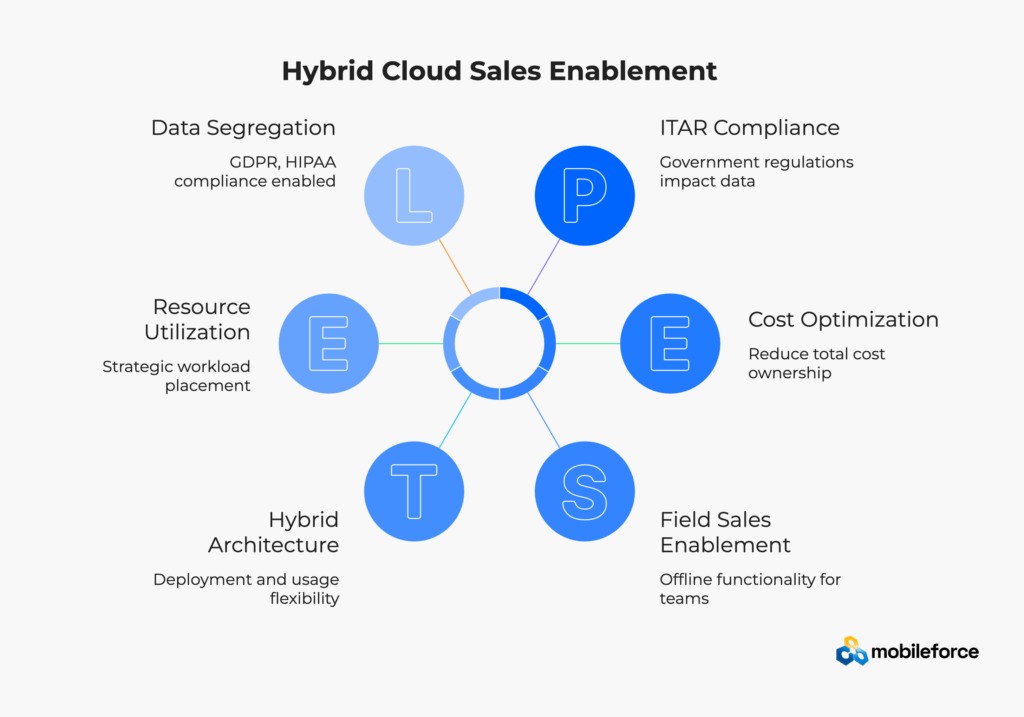
The configure price quote software market often treats hybrid deployment as a single concept, but successful organizations require hybrid capabilities across two distinct dimensions that directly impact revenue operations and sales effectiveness.
Mode of deployment addresses where your software and data physically reside, balancing cloud scalability benefits with on-premise control requirements for compliance, integration, and performance optimization.
Mode of use focuses on how your software operates during actual sales interactions, ensuring functionality whether sales teams are connected to corporate networks or working in completely offline environments.
According to HashiCorp’s 2024 State of Cloud Strategy Survey, conducted by Forrester Consulting, 78% of enterprises require both deployment and usage flexibility to support distributed sales teams while meeting regulatory obligations.
Organizations across industries face hard constraints that prevent pure cloud adoption for critical sales systems:
Regulatory requirements mandate specific data residency and processing controls. HIPAA regulations in healthcare, SOX compliance in financial services, and ITAR restrictions in defense contracting create legal boundaries that public cloud infrastructure cannot cross.
Competitive intelligence represents organizational crown jewels that require maximum security. Pricing algorithms, margin optimization strategies, and competitive analysis data provide sustainable advantages when properly protected through on-premise deployment.
Legacy system integration involves ERP platforms, pricing engines, and customer databases representing millions in infrastructure investments that cannot be abandoned during digital transformation initiatives.
Global performance requirements demand sub-second response times for quote generation across multiple continents, which geographically distant cloud data centers cannot consistently deliver.
Ready to explore how hybrid deployment can address your specific compliance and integration challenges? Schedule a personalized consultation with our solution architects.
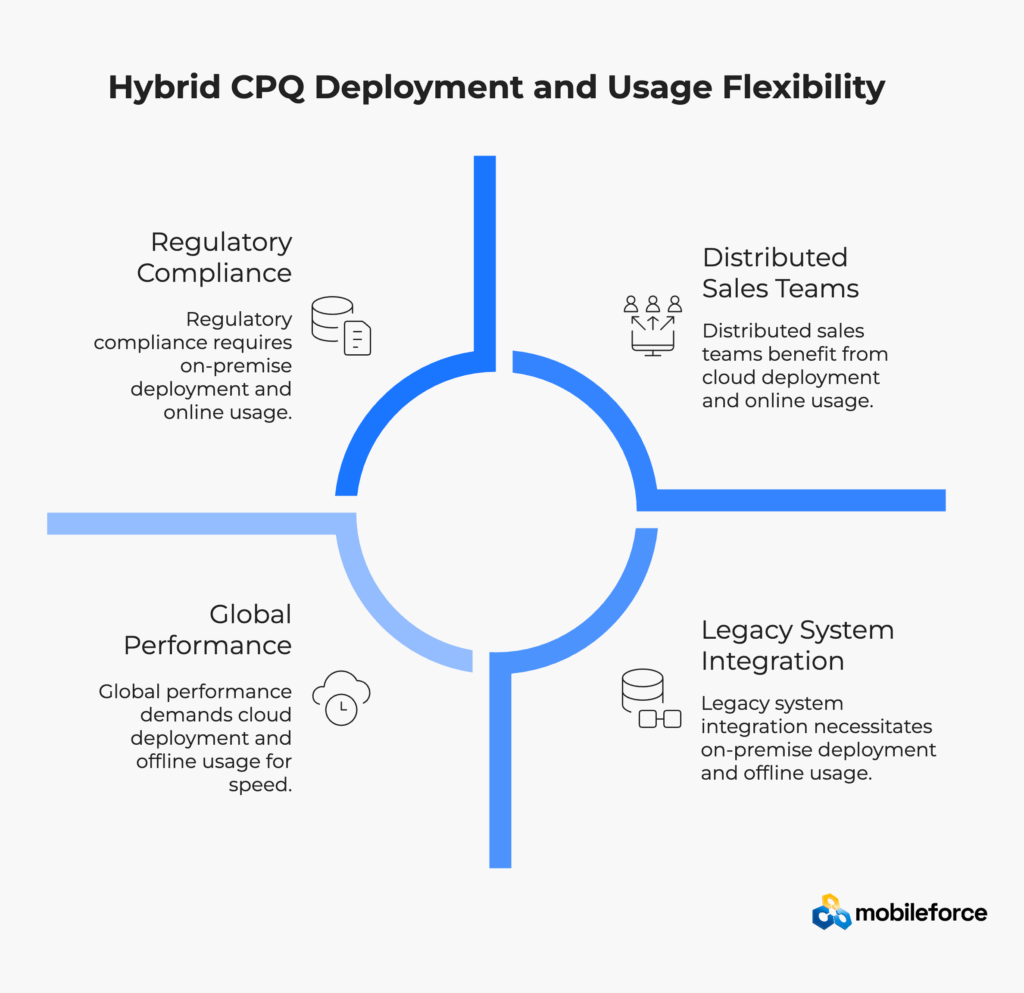
Deployment Model | Security Control | Scalability | Cost Structure | Implementation Time | Best For |
Pure On-Premise | Highest | Limited | High CapEx | 6-12 months | Highly regulated industries |
Pure Cloud | Medium | Unlimited | OpEx only | 2-6 weeks | Startups, rapid growth |
Hybrid Cloud | High | High | Optimized Mix | 4-8 weeks | Enterprise compliance + agility |
Deployment architecture becomes irrelevant when sales teams cannot access systems during critical customer interactions. Field sales professionals regularly encounter environments where traditional cloud CPQ systems become completely unusable.
Defense and government facilities implement signal-blocking security protocols that prevent any external network connections during classified discussions and system demonstrations.
Industrial manufacturing plants generate electromagnetic interference from heavy machinery that disrupts cellular and WiFi signals across facility floors where equipment configuration happens.
Oil and gas operations occur on offshore platforms and remote drilling sites where satellite internet connectivity is expensive, unreliable, and frequently interrupted by weather conditions.
Healthcare facilities in rural areas often lack reliable broadband infrastructure, yet medical device sales representatives must configure complex treatment systems during patient consultations.
According to recent workforce studies, 42% of field sales interactions occur in environments with compromised or prohibited network connectivity, making offline capability essential for revenue protection.
Traditional cloud CPQ vendors offer limited offline functionality through basic product catalog caching and simplified quote templates that cannot handle complex business rules, approval workflows, or sophisticated pricing calculations.
Comprehensive offline capability requires embedding complete business logic engines on local devices, enabling sophisticated quote generation that maintains full functionality regardless of network status.
Complete pricing calculations happen locally using cached cost data, competitive intelligence, and margin optimization algorithms without requiring cloud connectivity.
Multi-level approval workflows continue processing through conditional logic and role-based authorization even when approval systems cannot be reached online.
Product configuration rules prevent invalid combinations and enforce business policies through locally stored constraint engines and validation algorithms.
Document generation and delivery maintains professional quote presentation and customer communication capabilities during offline operations.
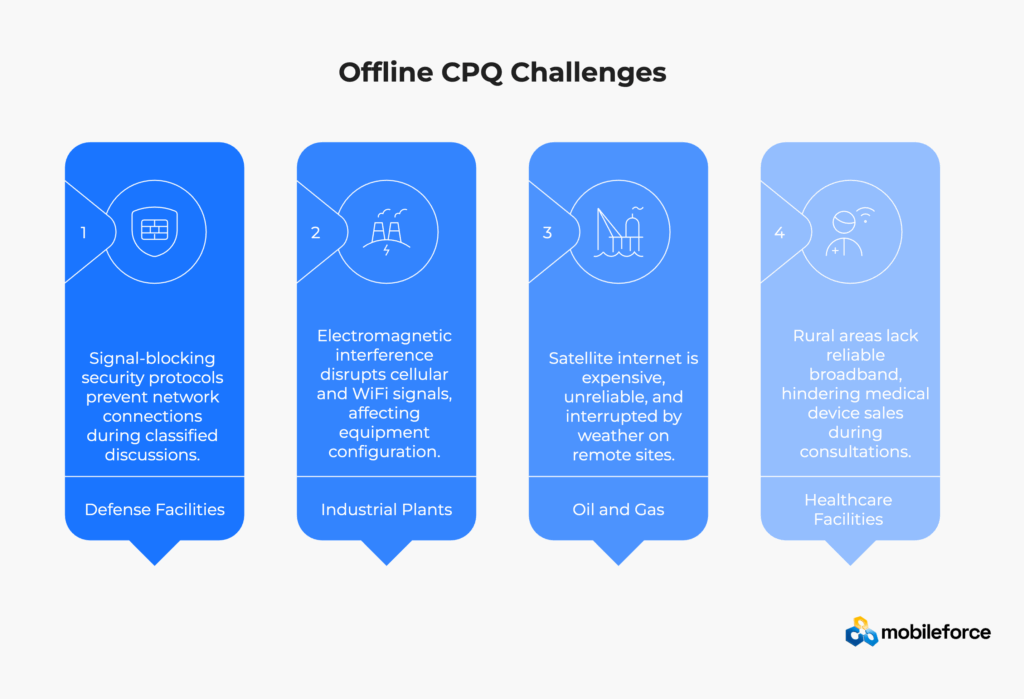
Defense contractors face the ultimate constraint combination: facilities where connectivity is prohibited by security protocols plus proprietary systems containing ITAR-controlled technical data that cannot reside in public cloud infrastructure.
Modern military procurement processes require sophisticated system configuration tools that can operate in classified environments while maintaining integration with defense contractor ERP systems and proprietary engineering databases.
Classified facility operations demand complete offline functionality for million-dollar system quotes generated during secure customer briefings and technical demonstrations.
ITAR compliance requires that technical specifications, pricing algorithms, and customer data remain within controlled infrastructure boundaries while enabling modern sales processes.
Complex approval workflows must function across multiple security clearance levels and organizational hierarchies without external network dependencies.
Discover how defense contractors are modernizing their quote-to-cash processes while maintaining security compliance. Schedule a demo to see classified-environment functionality.
Healthcare organizations balance strict regulatory compliance with support for distributed medical device sales teams serving hospitals, clinics, and research institutions across diverse geographic regions.
HIPAA regulations mandate that patient data and pricing information tied to medical records remain within specific geographic and infrastructure boundaries, while sales teams require modern tools for complex medical device configuration.
Patient data sovereignty ensures HIPAA compliance through on-premise processing of sensitive medical and financial information during treatment system configuration.
Rural healthcare support enables medical device configuration in clinics and hospitals with limited broadband infrastructure through comprehensive offline capabilities.
FDA regulatory integration maintains required documentation and approval trails for medical device sales while supporting field sales operations.
Industrial manufacturers sell complex engineered systems requiring sophisticated configuration tools while supporting field sales teams working in electromagnetically noisy manufacturing environments.
ERP system integration connects with on-premise manufacturing resource planning systems containing proprietary cost data, inventory levels, and production scheduling information.
Field sales operations enable complete system configuration in manufacturing plants where RF interference from heavy machinery disrupts traditional wireless connectivity.
Custom engineering workflows support complex approval processes for engineered-to-order products requiring technical review and manufacturing feasibility analysis.
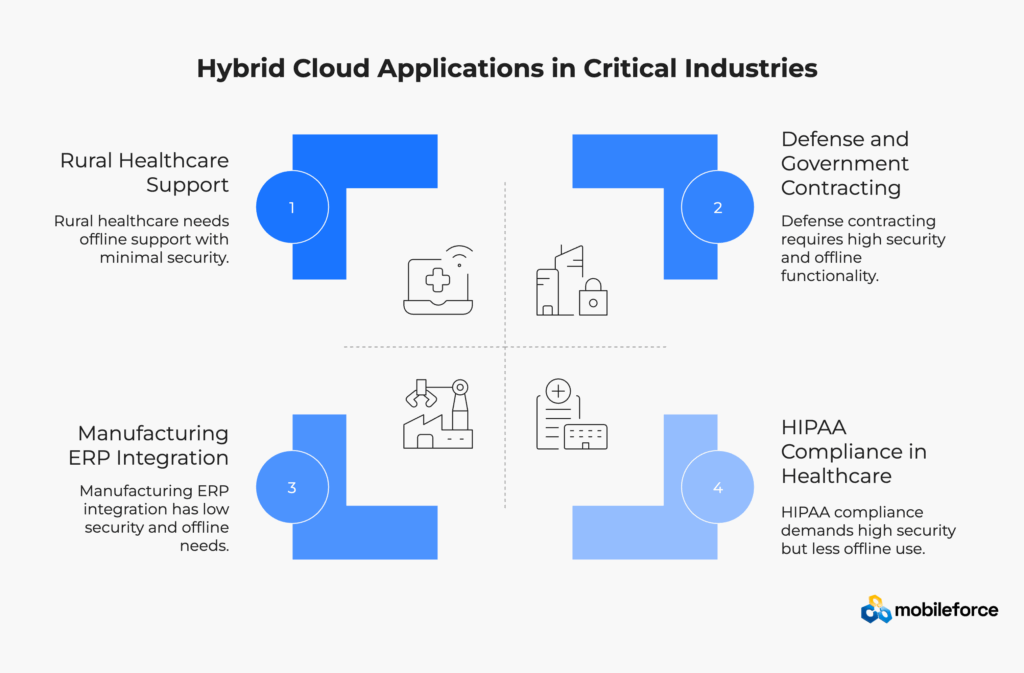
Comprehensive hybrid CPQ platforms implement enterprise-grade security architectures that connect with sensitive on-premise systems while maintaining air-gapped operational capability for offline environments.
Virtual private network connectivity enables secure, encrypted communication between cloud-based collaboration tools and on-premise pricing engines, inventory systems, and customer databases.
Data segregation policies ensure sensitive competitive intelligence, customer financial information, and proprietary algorithms remain within controlled infrastructure boundaries while enabling modern user experiences.
Identity and access management extends existing enterprise security frameworks across hybrid environments, maintaining role-based access controls and audit requirements.
Advanced offline capability requires sophisticated local processing engines that mirror server-side business logic without compromising functionality or accuracy during disconnected operations.
Pricing calculation engines embedded on devices perform complex margin optimization, volume discount calculations, and competitive pricing analysis using locally cached data structures.
Configuration constraint engines enforce product compatibility rules, technical specifications, and business policies through local validation algorithms that prevent invalid system combinations.
Approval workflow processors handle multi-level authorization requirements through conditional logic trees and role-based routing even when approval systems cannot be reached.
Document generation systems create professional proposals, technical specifications, and contractual documents using local templates and customer data. Modern document creation capabilities ensure professional output regardless of connectivity status.
See how embedded business logic enables sophisticated offline quoting. Request a technical demo showcasing disconnected operation capabilities.
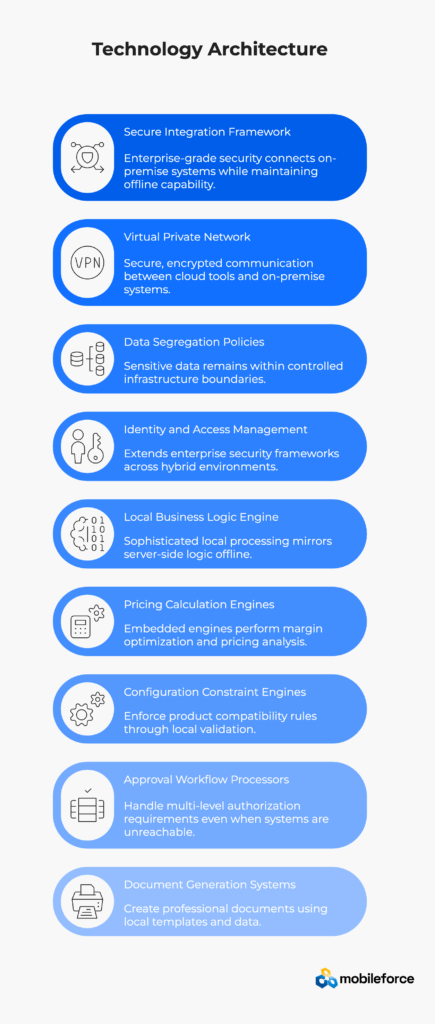
Organizations implementing intelligent hybrid architectures report measurable improvements across operational and financial metrics through strategic workload placement and resource optimization.
Cost reduction of 20-30% through hybrid resource utilization, avoiding over-provisioning on-premise infrastructure for peak demand while eliminating premium cloud costs for baseline operations, according to McKinsey’s 2024 Cloud Economics report.
Compliance assurance reduces regulatory risk exposure and potential penalty costs through proper data handling, residency controls, and audit trail maintenance across distributed architectures.
Performance improvement delivers 60-80% faster response times for global teams through local processing and geographic optimization of compute resources.
True offline capability provides additional value through elimination of connectivity-related deal delays and customer satisfaction issues during critical sales interactions.
Deal velocity acceleration of 40-60% when sales cycles no longer depend on network availability during customer meetings, demonstrations, and proposal generation activities.
Win rate improvement of 25-35% when sales teams can generate sophisticated quotes in any environment, including locations where competitors’ cloud-only systems fail completely.
Customer satisfaction enhancement through elimination of “connectivity required” delays during time-sensitive purchasing decisions and technical demonstrations.
Capability | Basic Caching | Advanced Offline | Mobileforce Hybrid |
Product Catalog Access | ✓ | ✓ | ✓ |
Simple Price Calculation | ✗ | ✓ | ✓ |
Complex Pricing Rules | ✗ | ✗ | ✓ |
Approval Workflows | ✗ | Limited | ✓ |
Document Generation | ✗ | Basic | ✓ |
ERP Integration Data | ✗ | ✗ | ✓ |
Conflict Resolution | ✗ | Basic | ✓ |
Audit Trail Maintenance | ✗ | ✗ | ✓ |
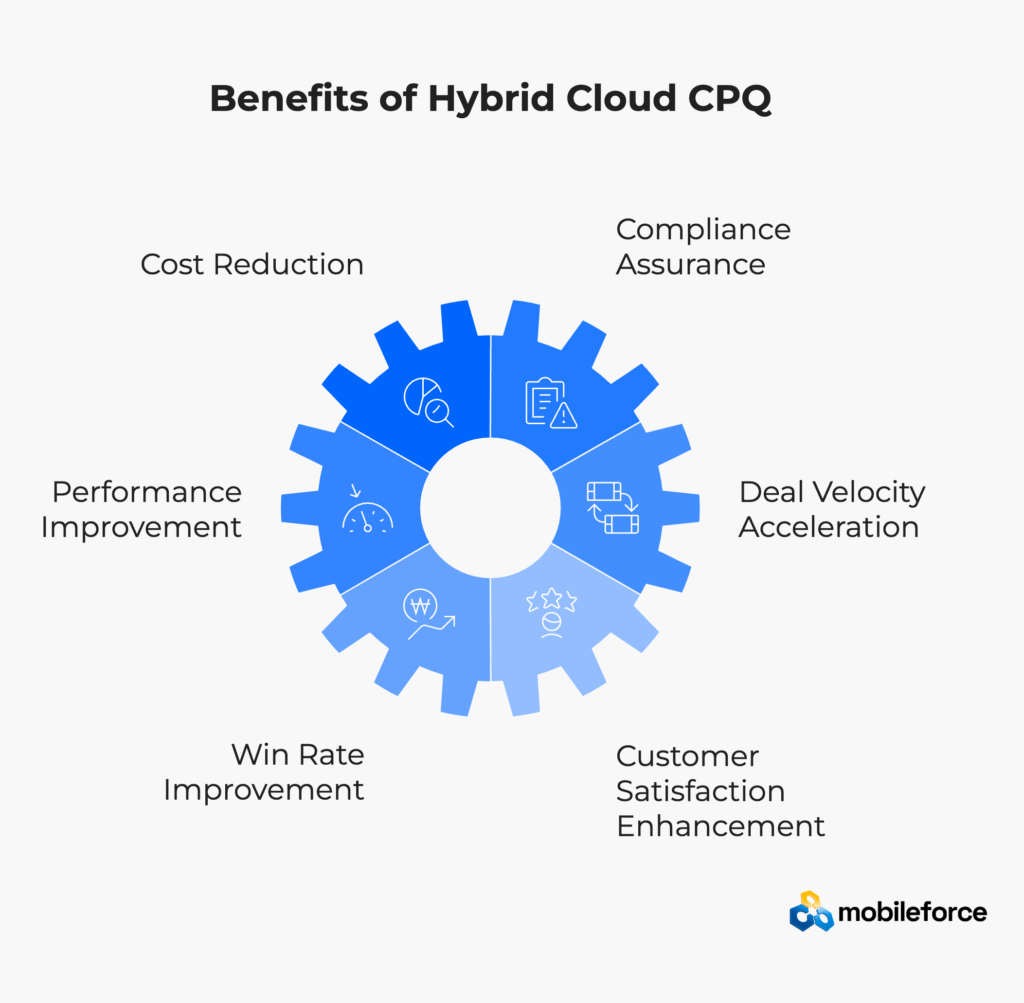
Successful hybrid CPQ implementations begin with comprehensive evaluation across both deployment and usage requirements to identify specific organizational needs and constraints.
Deployment assessment evaluates regulatory compliance obligations, existing system integration complexity, data sovereignty requirements, and performance expectations for global sales teams.
Usage assessment analyzes field sales team connectivity challenges, offline workflow complexity, customer interaction environments, and competitive impact of system availability.
Organizational readiness reviews technical capabilities, change management resources, vendor relationship requirements, and budget allocation for comprehensive transformation initiatives.
Choosing platforms that excel across both hybrid dimensions requires evaluation of proven capabilities, technical architecture, and implementation track record in similar organizational environments.
Deployment capabilities include hybrid architecture experience, security framework maturity, integration depth with enterprise systems, and flexible workload placement options.
Usage capabilities encompass offline business logic processing, intelligent synchronization algorithms, mobile-first design philosophy, and field-tested reliability in challenging connectivity environments.
Implementation support involves methodology maturity, change management expertise, technical training programs, and ongoing optimization services.
Ready to evaluate your hybrid CPQ requirements? Schedule a strategic assessment with our solution architects.
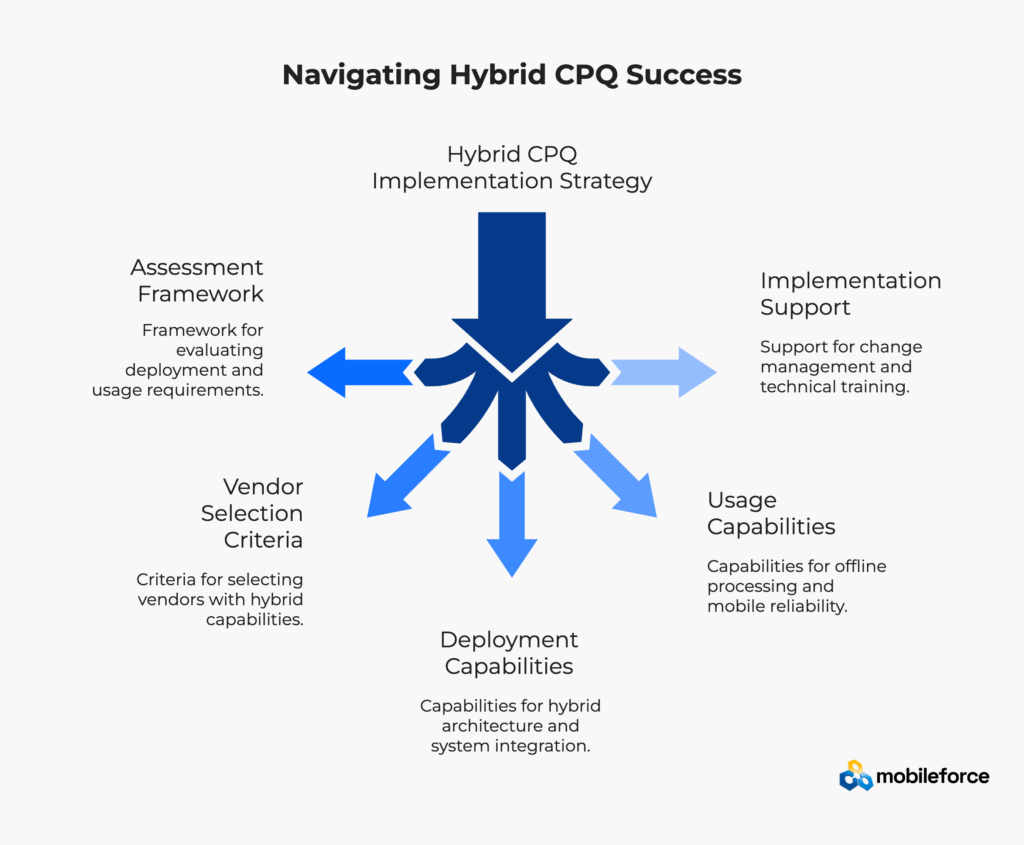
Hybrid CPQ architectures must accommodate emerging technologies including artificial intelligence, machine learning, and advanced analytics while maintaining security, compliance, and offline operational requirements.
AI-powered pricing optimization enhances margin management through predictive analytics and competitive intelligence processing within secure hybrid environments. AI assistants can provide intelligent quoting recommendations while respecting data sovereignty requirements.
Machine learning configuration assistance improves user experience and quote accuracy through pattern recognition and automated constraint validation.
Advanced analytics integration provides sales performance insights and market intelligence while respecting data sovereignty and privacy requirements.
Increasing focus on data privacy, cross-border data transfer restrictions, and industry-specific compliance requirements will drive continued demand for sophisticated hybrid deployment capabilities.
Privacy regulation expansion across global markets increases requirements for data residency controls and processing transparency in sales systems.
Industry-specific mandates in healthcare, financial services, and defense sectors continue evolving toward stricter data handling and system security requirements.
Cross-border commerce complexity creates additional constraints for multinational sales organizations managing diverse regulatory environments.
Organizations implementing comprehensive RevOps strategies must consider these evolving requirements when selecting hybrid CPQ solutions that can adapt to changing compliance landscapes.
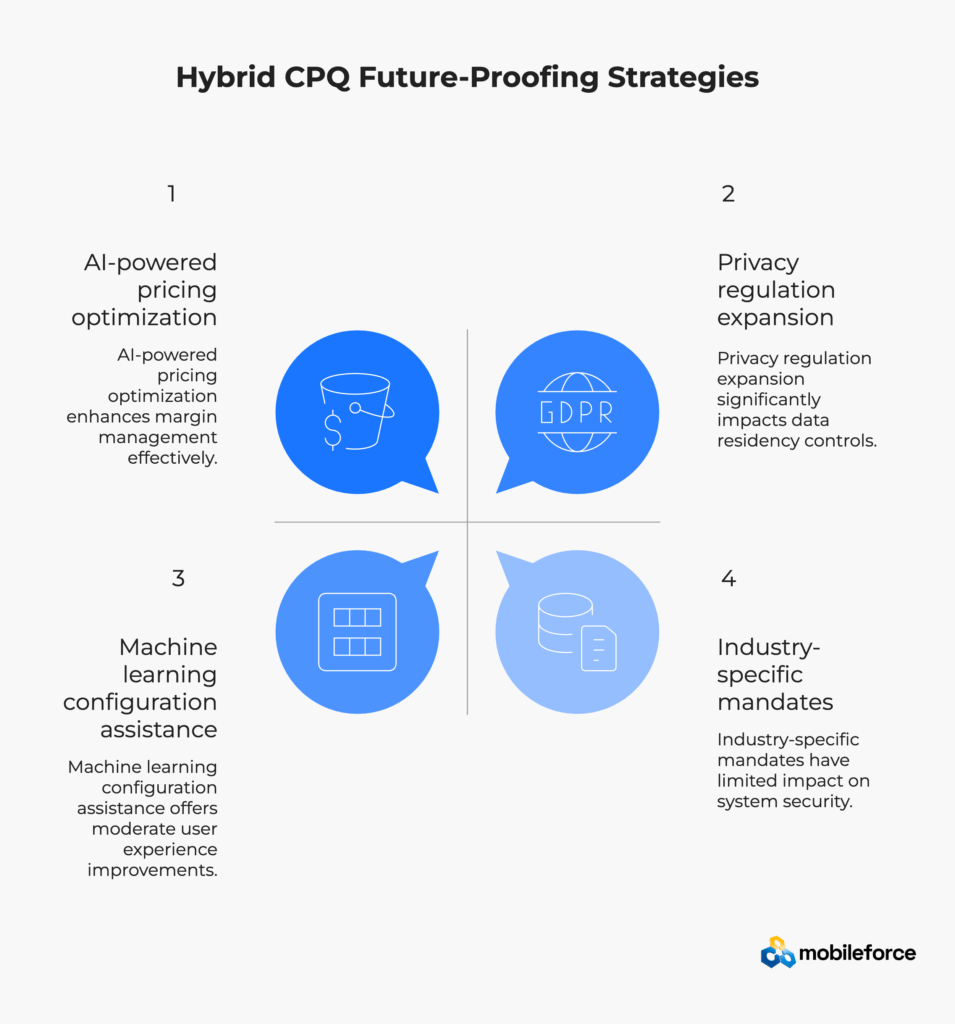
Investment Category | Year 1 Cost | 3-Year Benefits | ROI Calculation |
Platform Licensing | $75,000 | $450,000 | 500% ROI |
Implementation Services | $50,000 | $300,000 | 500% ROI |
Integration Development | $25,000 | $200,000 | 700% ROI |
Training and Change Management | $15,000 | $150,000 | 900% ROI |
Total Investment | $165,000 | $1,100,000 | 567% ROI |
Benefits calculated from improved deal velocity, reduced error costs, enhanced win rates, and operational efficiency gains based on industry benchmarks and customer case studies.
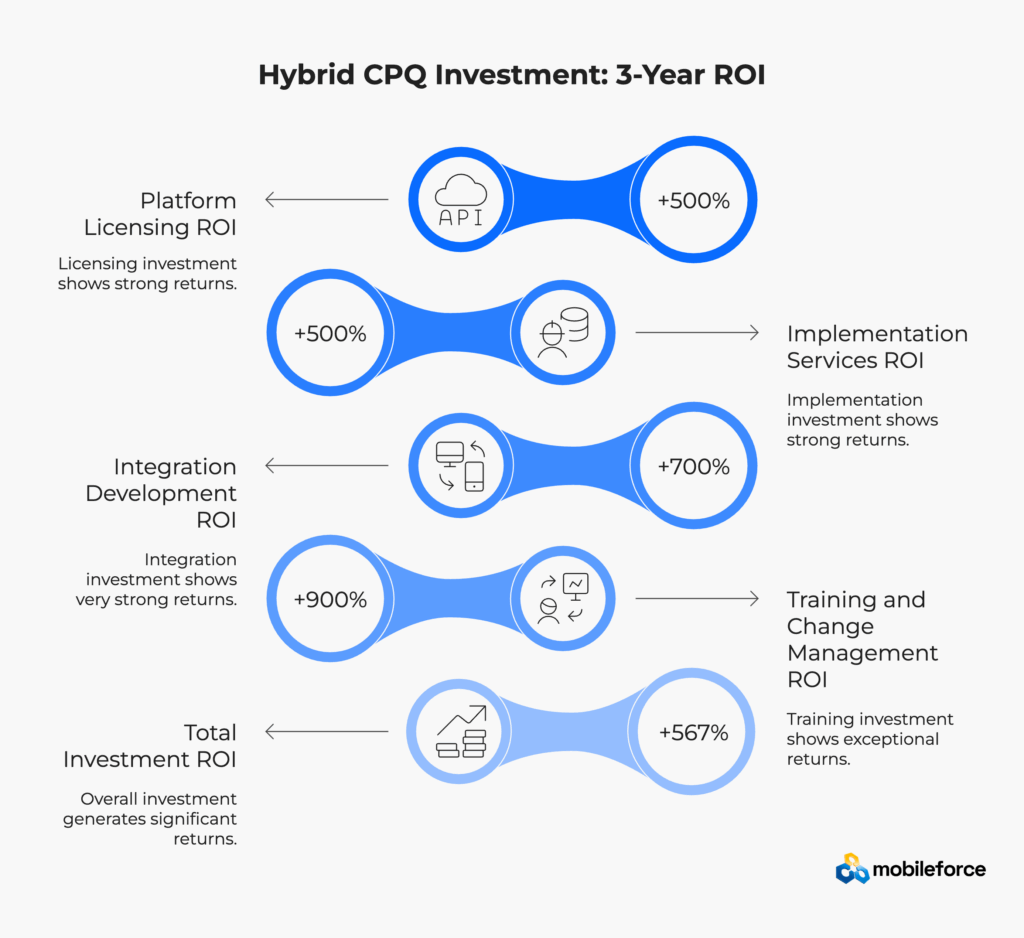
Hybrid CPQ becomes essential when organizations face constraints in either deployment or usage dimensions that prevent effective sales operations using traditional single-environment solutions.
Consider hybrid deployment when:
Consider hybrid usage when:
Choose comprehensive hybrid solutions when:
Transform your sales operations with comprehensive hybrid CPQ capabilities. Schedule your demo to experience both secure on-premise integration and complete offline functionality.
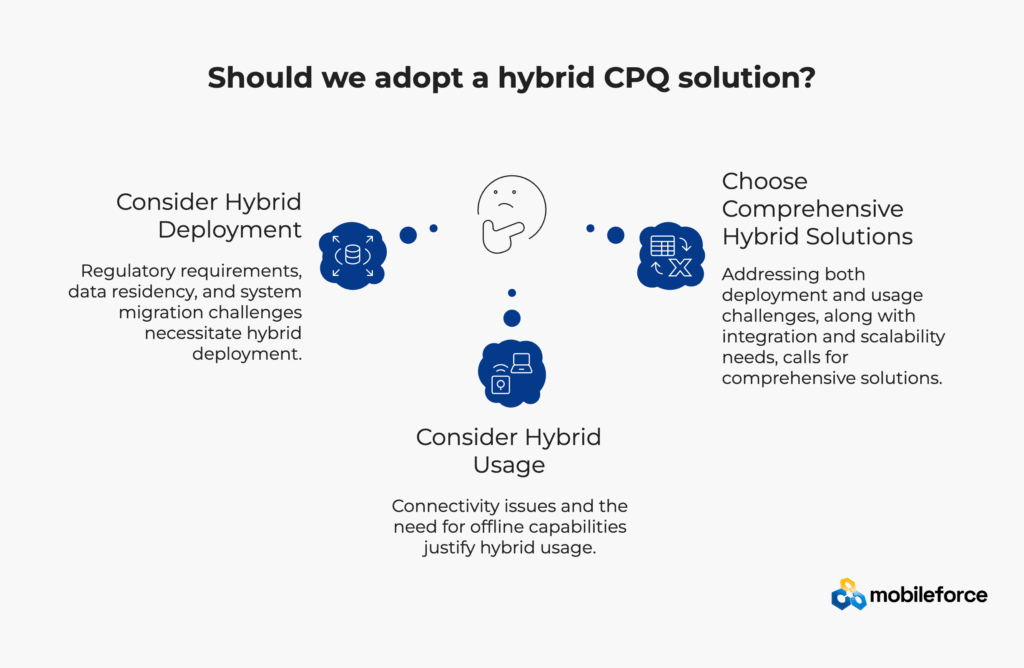
Hybrid cloud CPQ combines on-premise infrastructure with cloud platforms to deliver configure-price-quote functionality across two dimensions: deployment flexibility for compliance and control, plus operational continuity for offline usage. Unlike traditional cloud-only or on-premise-only solutions, hybrid architectures enable organizations to maintain sensitive data locally while leveraging cloud scalability for non-critical operations, while simultaneously supporting field sales teams working without network connectivity.
Hybrid CPQ architectures address data compliance through strategic data placement and processing controls. Organizations can maintain sensitive pricing, customer, and competitive intelligence in on-premise environments that meet GDPR, HIPAA, ITAR, and other regulatory frameworks while using cloud resources for document generation, collaboration, and analytics. This separation ensures compliance with data residency requirements while enabling modern sales functionality.
Yes, advanced hybrid CPQ platforms embed complete business logic engines on local devices, enabling sophisticated quote generation that maintains full functionality regardless of network status. This includes complex pricing calculations, multi-level approval workflows, product configuration rules, and document generation using locally cached data and processing engines that mirror server-side functionality.
Hybrid CPQ implementations involve both capital expenses for on-premise infrastructure and operational expenses for cloud services, but enable cost optimization through intelligent workload placement. Organizations typically achieve 20-30% cost savings compared to pure cloud solutions by placing predictable workloads on-premise where capital investments provide long-term value while using cloud resources for variable demand and collaboration features.
Implementation timelines vary based on integration complexity and organizational requirements, but modern hybrid CPQ platforms with pre-built connectors and no-code configuration capabilities can be deployed in 4-8 weeks compared to 6-18 months for traditional enterprise CPQ solutions. The accelerated timeline results from intelligent architectures that adapt to existing business processes rather than requiring extensive customization.
Defense and government contracting, healthcare and life sciences, manufacturing and industrial distribution, and oil and gas operations benefit significantly from hybrid CPQ architectures. These sectors typically require strict data governance, offline functionality for field teams, integration with legacy systems, and performance optimization for global operations. However, any organization with complex compliance requirements or distributed sales teams can realize substantial benefits.
Hybrid architectures provide natural redundancy across multiple infrastructure types. If on-premise systems experience outages, cloud components can maintain essential functionality, and vice versa. This redundancy significantly improves recovery times and reduces business disruption compared to single-environment approaches, with organizations typically experiencing 50-70% improvement in business continuity metrics.
Successful hybrid CPQ implementations require robust API capabilities, real-time data synchronization engines, and comprehensive pre-built integrations with CRM, ERP, and business systems. Leading platforms offer 200+ pre-built connectors and API-first architectures to simplify integration complexity while supporting both real-time and batch synchronization patterns based on specific business requirements and security policies.
Hybrid CPQ provides superior mobile sales support through genuine offline capability that enables complex quote generation without network connectivity. Cloud-only solutions typically offer basic caching or simplified forms that cannot handle sophisticated pricing rules, approval workflows, or integration data. Hybrid platforms maintain full functionality across all environments while providing intelligent synchronization when connectivity resumes.
Organizations looking to optimize their sales teams operations benefit significantly from hybrid approaches that eliminate connectivity as a barrier to revenue generation. This becomes particularly important when integrating with field service management systems for comprehensive customer engagement.
Hybrid CPQ security requires comprehensive strategies addressing data in transit, at rest, and in processing across multiple environments. Best practices include implementing zero-trust architectures, using API gateways for controlled access, maintaining detailed audit logs, and ensuring consistent identity and access management across all systems. Leading platforms provide built-in security frameworks that address hybrid-specific vulnerabilities and compliance requirements.
For organizations evaluating migration from existing systems, security architecture compatibility becomes a critical factor in vendor selection and implementation planning.